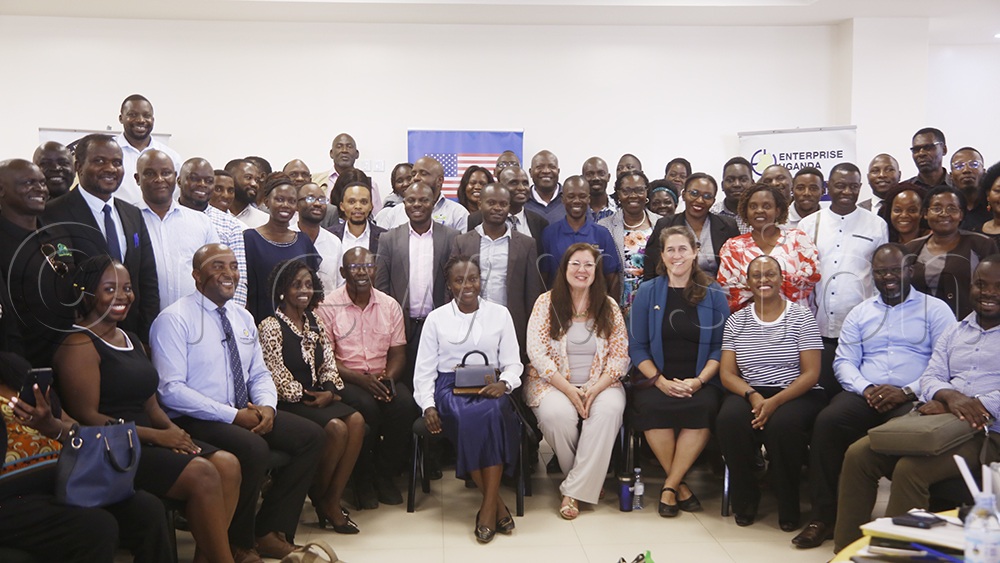Enterprise Uganda, US Embassy, equip exporters with tools for global market success
“There are a few things that you must take care of to break into the export market. One of them is quality. For example, you gave me a pineapple last time; it was of average size. The next shipment looked like a mango, and later like a watermelon,” Ocici explained.
Experts from the US Embassy and Enterprise Uganda training entrepreneurs on how to tap into global markets, this was at the Enterprise Uganda Centre of Excellence offices. (Credit: Aloysious Kasoma)
Enterprise Uganda and the U.S. Embassy co-hosted a Trade Facilitation Workshop designed to empower Ugandan exporters and entrepreneurs with practical insights into accessing international markets and succeeding in global trade.
The workshop, held at the Enterprise Uganda Centre of Excellence last week, brought together experts to guide local businesses on quality standards, market entry strategies, and operational best practices.
On preparing Ugandan entrepreneurs for international trade, Charles Ocici, Executive Director of Enterprise Uganda, highlighted the essential factors needed to enter export markets successfully.
He noted that meeting market expectations goes beyond simply having a product to sell.
“There are a few things that you must take care of to break into the export market. One of them is quality. For example, you gave me a pineapple last time; it was of average size. The next shipment looked like a mango, and later like a watermelon,” he explained.
Ocici also pointed out that consistency must be gotten right, and the regularity of volumes, the appearance and packaging of your products. These factors determine your entry into that marketplace.
He painted the need for sound cost management and strong internal business capabilities.
“Once you have entered the marketplace and quality, volumes, and consistency are acceptable, the next step is managing your cost structure to remain competitive on value for money. Entrepreneurs already face macroeconomic challenges such as poor infrastructure, financing constraints, and labour issues. How effectively you manage these factors, along with your own internal capabilities as a business owner, will ultimately determine your success in the global market,” he said.
He stressed Enterprise Uganda’s role in preparing exporters. “As we work on the country’s export platform, we must ensure exporters are properly primed and ready. It’s not just about finance or government protocols. You cannot just bring anything from Uganda and expect success. We did that with AGOA, but the country struggled. Africa struggled. There is much work to be done to establish a footprint in the export market, and that footprint must reflect your country’s identity.”
Esther Psarakis, a U.S. expert on international markets and trade, encouraged entrepreneurs to embrace learning through small mistakes.
“Start making small mistakes. When you’re starting out, you will inevitably make mistakes—but you don’t want them to be big ones. First, start in your own neighbourhood. Grow and develop your business where you are,” she said.
Psarakis illustrated a concentric-circle strategy for scaling. “Saturate your local market to maximise growth, margins, and profit, then use those proceeds to expand regionally. Whether it’s a commodity-based or retail product, test locally first. Check packaging, branding, and product messaging. The last thing you want is to spend hundreds of thousands of shillings on unusable packaging. Engage standards officials early to avoid mistakes.”
A group of Entrepreneurs after the training. (Credit: Aloysious Kasoma)
Standards key to market access
Ronald Mukasa, Head of Innovation and Learning at Enterprise Uganda, highlighted the government’s strategic priorities and the support available to entrepreneurs.
“The government’s 10-fold growth strategy focuses on sectors like agro-industrialisation, tourism, minerals, and science and technology—the ATMs. Strengthening entrepreneurs to access the export market is a big idea. Export is a long journey,” he said.
Mukasa emphasised the role of standards and best practices.
“Entrepreneurs also need a coordinated support system, including the Uganda National Bureau of Standards, Uganda Free Zones, and Export Promotions Authority. A successful export journey requires understanding standards,” he pointed out.
However, he pointed out that the challenge is best practices in the production process, and this remains a challenge in Uganda’s entrepreneurial sector. Testing labs and business development services, covering governance, HR, financing, and letters of credit, are all critical to gaining trust with international partners.
Martin Sebulime, Certification Officer and Lead Auditor at UNBS, stressed the importance of implementing robust systems before seeking certification.
“Establish the system first. Is there traceability from the farm to the product? If there is a recall, can you trace it back? How is labelling done? Are allergens declared? These economies are sensitive. Misaligned labels can cost you millions. Seek knowledge on market requirements and align your labels before ordering,” he advised.
On certification, Sebulime added, “Certification gives you market access, but it comes to someone who has prepared a system. It is a third-party attestation that your system meets the required standards, whether US or Global GAP. Start implementing systems, even small ones like Good Manufacturing Practices. Even if certification is not achieved this year, aim for it next year.”